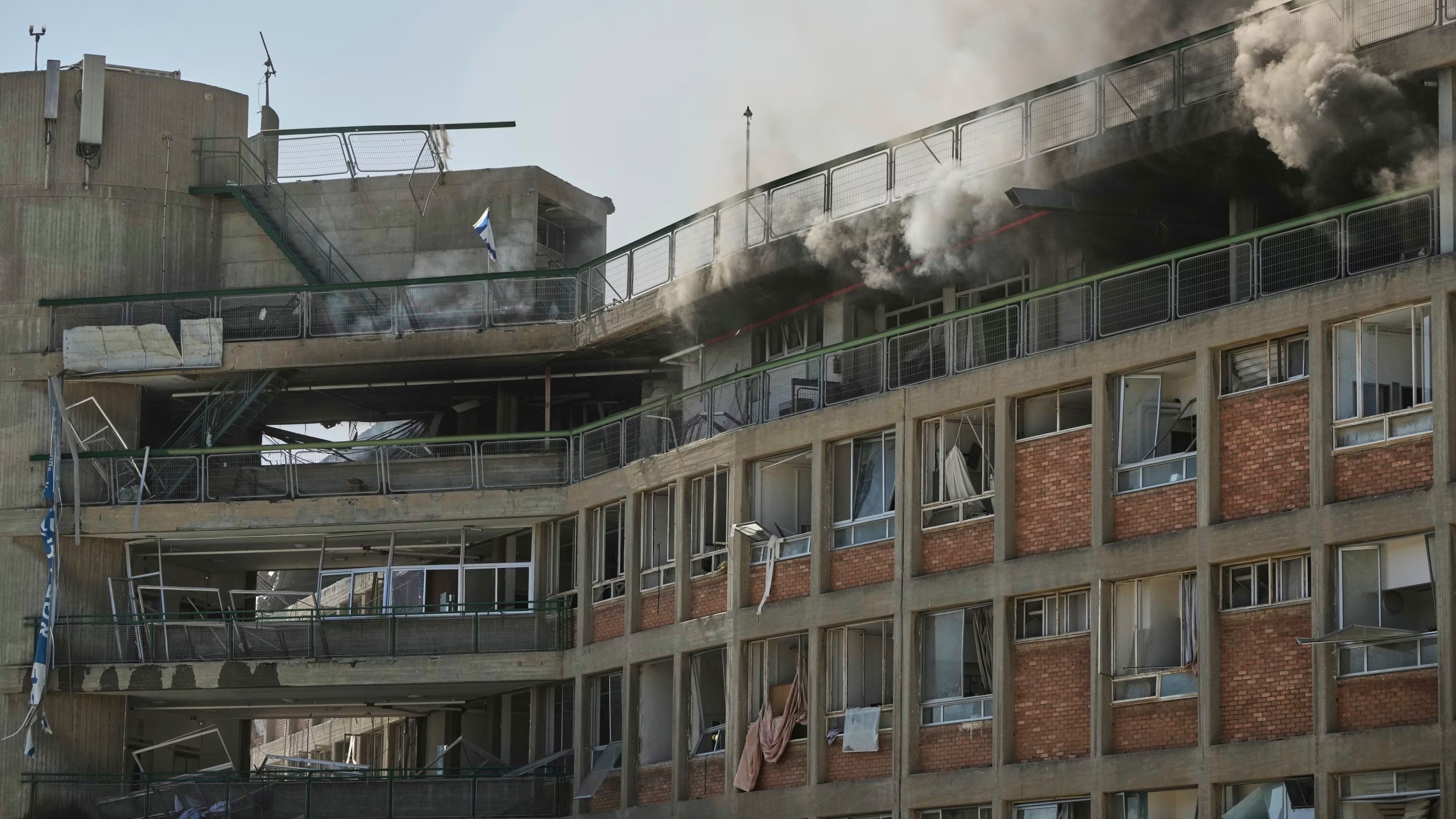Israel’s defense minister issued a stark warning to Iran’s supreme leader on Thursday, June 19, 2025, following a fresh missile attack from Iran that struck a major hospital in southern Israel and damaged residential buildings near Tel Aviv.
In response, Israeli forces targeted Iran’s heavy water reactor, a critical part of its nuclear program, the Associated Press reports.
The Israeli Health Ministry reported that at least 240 people were injured by the Iranian missile barrage, four of them seriously.
Most casualties were minor, including over 70 from Soroka Medical Center in Beersheba, where smoke billowed as emergency teams rushed to evacuate patients.
Israel’s Defense Minister Israel Katz directly blamed Iran’s Supreme Leader Ayatollah Ali Khamenei.
He said the Israeli military had been ordered to ensure that Khamenei “absolutely should not continue to exist” if Israel’s goals are to be met.
This marks an unusually explicit threat.
U.S. officials confirmed that President Donald Trump had previously vetoed an Israeli plan to assassinate Khamenei, and Trump later said no such action was currently planned.
The recent Israeli strike on Iran’s Arak heavy water reactor signals the continuation of efforts to dismantle Tehran’s nuclear ambitions.
The conflict ignited last Friday when Israel launched surprise airstrikes targeting Iranian military sites, senior commanders, and nuclear scientists.
An Iranian human rights group based in Washington reports that at least 639 people, including 263 civilians, have been killed inside Iran since the conflict began, with over 1,300 wounded.
Iran has retaliated by firing more than 400 missiles and launching hundreds of drones into Israel, causing at least 24 deaths and injuring many more.
Missile Hits Soroka Hospital
Two doctors, speaking anonymously to The Associated Press, described how a missile hit Soroka Medical Center.
Accordin to them, this happened moments after air raid sirens sounded, producing a loud explosion heard inside a hospital safe room.
Fortunately, the hospital had evacuated an older surgical building days earlier, and no serious injuries were reported from the strike.
Soroka is a major medical facility with over 1,000 beds, serving roughly one million residents in southern Israel.
After the attack, the hospital limited admissions to life-threatening cases only.
Israeli Prime Minister Benjamin Netanyahu condemned the strike and vowed a forceful response, declaring: “We will exact the full price from the tyrants in Tehran.”
Iran’s missile and drone attacks have largely been intercepted by Israel’s sophisticated multi-layer air defense systems.
They were reportedly designed to protect population centers and critical infrastructure, though officials acknowledge these systems are not foolproof.
Hospitals across Israel have adapted to the conflict by activating emergency protocols, including converting underground parking into hospital space and relocating vulnerable patients to protected areas.
Israel also maintains an underground blood bank, a facility activated during the ongoing Gaza conflict that began with Hamas’ October 7, 2023 attacks.
No Radiation Threat After Reactor Strike
Israel’s military confirmed its airstrike on the Arak heavy water reactor targeted components intended for plutonium production, aiming to prevent Iran from restoring the facility for nuclear weapons development.
Israel also claimed a separate strike on a nuclear-related site near Natanz.
Iranian state media assured the public there was no radiation risk from the strike.
A reporter near the Arak site said the area had been evacuated, and there was no damage to nearby civilian zones.
Israel had issued advance warnings urging people to leave the area before the strike.
Iran’s Nuclear Program and Diplomatic Moves
Iran insists its nuclear activities are peaceful, though it enriches uranium up to 60% purity, close to weapons-grade levels.
Iran remains the only non-nuclear-armed country to enrich uranium to such a degree.
Israel is widely believed to possess nuclear weapons, though it maintains official silence on the matter.
Following the strike, Iran’s Supreme Leader Khamenei rejected U.S. calls for surrender and warned that any deeper American military involvement would cause “irreparable damage.”
Israel had relaxed some restrictions on daily life Wednesday, suggesting a temporary easing of missile threats.
Iran’s Foreign Minister Abbas Araghchi announced plans to travel to Geneva for talks with European diplomats.
These include representatives from the UK, France, Germany, and the EU, signaling potential diplomatic efforts to ease tensions.
Meanwhile, former U.S. President Trump expressed his desire for a “much bigger” outcome than a ceasefire and did not rule out U.S. participation in Israel’s campaign.
Iran warned of severe consequences if America escalates its involvement.
Background on Arak Reactor
Located 155 miles southwest of Tehran, the Arak heavy water reactor uses heavy water to cool its core but produces plutonium—a material that could be used for nuclear weapons.
Under the 2015 nuclear deal, Iran agreed to redesign the reactor to reduce proliferation risks.
However, after the U.S. withdrew from the deal in 2018, Iran reportedly purchased parts to rebuild the reactor. Israel’s recent strike demonstrates ongoing concern that Iran could use the facility to produce plutonium for weapons in the future.
The International Atomic Energy Agency (IAEA), the U.N.’s nuclear watchdog, has urged Israel to avoid strikes on Iranian nuclear sites.
The agency last inspected Arak in mid-May but has since lost full oversight due to Iranian restrictions on inspections, making it difficult to verify Iran’s activities.







